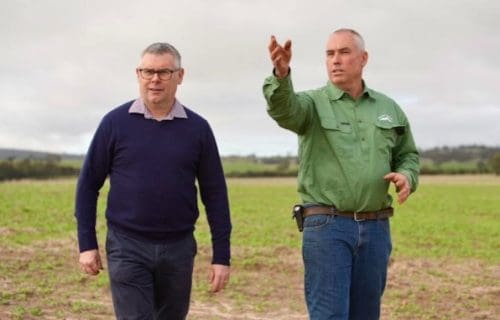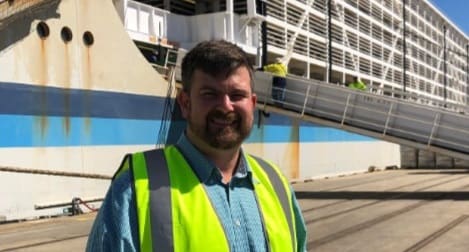
Minister for Agriculture Murray Watt, left, talks with Brookton farmer Murray Hall on his wheat and wool farm last week. Image: Supplied.
MINISTER for Agriculture Murray Watt and sheep exporters have identified the wider commodity trading and meat processing implications of the live trade’s proposed phase-out as needing more attention.
After visiting Western Australian live sheep trade stakeholders last week, Mr Watt said he would not commit to touring a live export vessel or consulting with Middle East importers, because he is taking time to reflect on his trip’s findings before deciding his next move.
“I’ve obviously got a range of other issues I’ve got to deal with in the portfolio as well, so I just want to make sure that the next steps are the right ones at the right time.
“I’m certainly conscious that we need to manage our diplomatic relationships well, particularly with Kuwait in this case, but other countries as well and we would want to make sure that whatever we do in terms of live exports doesn’t impact on our trade relationships in other parts of the ag sector,” the minister said.
“So it is certainly something I’m conscious of and again giving thought to.”
Will phasing out live sheep exports be a ‘risky business?’
Click here to read Thomas Elders Markets’ analyst Matt Dalgleish’s latest analysis of the question: Will a ban to live sheep exports damage our trade across other commodities to key trade partners?’
A Department of Agriculture Environment and the Environment spokesperson said there is an opportunity to value add by processing sheep meat in Australia and increasing processing throughput would create more jobs and contribute to the economy.
“Consultation with industry, other impacted stakeholders and state governments, and research on these very matters, is key to ensuring that the best framework is developed for a fair and orderly transition.”
The spokesperson said based on historic slaughter trends, the department understands there is additional slaughter capacity in Western Australia at existing small stock processing sites, should the approximately 600,000 head of sheep slated for live export need processing domestically.
“This is based on the assumption that existing operational establishments would be able to increase the number of operational shifts and/or chain speeds to historical capacities; and that a number of processing establishments are proposing to restart operations.”
Australia trades in food security and animal welfare – ALEC

ALEC CEO Mark Harvey-Sutton: welcomes trade phase-out reprieve.
ALEC chief executive officer Mark Harvey-Sutton said exporters are appreciative that Minister Watt has recognised the importance of managing the diplomatic sensitivities of the government’s policy.
“What can’t be forgotten in the discussions about shutting down the live sheep trade is the fact that we don’t trade in commodities in the simplest sense – we trade in food security and animal welfare.
“The export of livestock has also been the key to opening many of these markets to other Australian Agricultural products including boxed meat. It would also be important to the overall trading relationship a state like Western Australia would have in the Middle East, “ he said.
“The trade with our middle eastern partners has been enduring because Australia has been a reliable supplier of their livestock needs, and in turn these markets have partnered with Australia to improve animal welfare standards and expanded their appetite for other produce.
“This sort of partnership cannot be maintained by boxed meat. Instead livestock will be sourced from other suppliers and Australia’s reputation as a reliable supplier for food security will be tarnished,” Mr Harvey-Sutton said.
“That won’t do our global reputation any favors and I think it’s inevitable other commodities, and potentially other markets, will be impacted by this, as will our ability to work together on animal welfare improvements.”
Minister supports analysis of processing options and trade impacts
Mr Watt also said he was also interested in commissioning a proper analysis of the prospects for additional sheep/lamb processing in Western Australia and the likely impact on farmer sheep prices as part of implementing the Albanese Government’s commitment to phase out live sheep exports. The proposal has the support of the Australian Livestock Exporters Council.
Mr Watt said he met with WA sheep processors Minerva, V. & V. Walsh and Fletchers International Exports during his recent WA trip.
“They were of the view that there were definitely opportunities to expand onshore meat processing, potentially as a replacement for the live export trade.”
“But they did point to the workforce shortages they were already having and that that would need to be tackled if we were going to see increased production,” he said.
Mr Watt said they didn’t talk about co-investment in great detail.
But mentioned to the processors the ALP’s $5bn reconstruction fund commitment and its $500 component for agriculture, forestry and fisheries, which “absolutely does” still stand, despite the trillion dollar debt Australia is facing.
“It’s one of those cases where it does require public investment, but it also provides an enormous economic return and the whole reason behind that package , including the ag component, is to deliver on our plans for more value-adding in our country,” Mr Watt said.
“So that reconstruction fund will potentially be available for co-investment in expanded onshore meat processing.”
Mr Watt said there is obviously a lot of value-added red meat processing happening in WA already.
“What I was hearing was that not only is there a growing market in the Middle East for processed meat, but there are new markets opening up for us that we haven’t fully explored – whether it be India, Singapore or UK, with the free trade agreement.”
Mr Watt said he is also “giving thought to’ the issue of removing price competition from the WA sheep market.
“But the way I see it is, it is not as if processing for the export market would be the only market for sheep raised in WA, obviously there is already a pretty big supply to the eastern seaboard at different points in the climatic cycle, especially.
“I’ve got to look at this in more detail, but the way I’m thinking about is that if we can open up more markets for export processed meat that then provides competition in its own right,” he said.
“So then you’ve got different countries competing for our processed product and I think that would provide a level of competition.”
Mr Watt acknowledged he had been referring to ‘research’ indicating more onshore processing in Western Australia would create jobs and that community sentiment, expressed in opinion polling, is against the trade continuing.
“I recognise that the industry is able to point to different research that had different findings.
“In terms of the opportunities for increased production (in meat processing), it’s more in this case (from) departmental advice rather than fully fleshed out research,” he said.
“But that is something I would be interested in commissioning some proper analysis of as part of implementing the commitment.”
Industry ready to assist in better informing ALP policy – ALEC
Mr Harvey-Sutton said a policy of the gravity of the live sheep trade’s phase-out, that sees livelihoods put at risk, requires thorough analysis, accuracy and balance.
“The only studies that I have seen that suggest there is economic benefit in closing the live trade have been commissioned by entities that want to see it closed.
“While capacity to process animals domestically may exist in theory, provided adequate workforce exists, this doesn’t equate to an economic benefit,” he said.
“When you consider that competition for livestock would be removed from markets, the potential for irreparable damage to key agricultural trading partners and the erosion in confidence that would exist across all Australian agricultural markets should this shutdown precedent occur – I fail to see how economic benefit can be derived.
“The industry undertakes to assist Minister Watt and the Albanese Government with any process that seeks to better inform its policy,” Mr Harvey-Sutton said.
“We also agree with Minister Watt that work on this policy should be undertaken calmly and pragmatically, noting the commitment by both the Prime Minister and Minister Watt that the shutdown will not occur before the next election.”
Albanese Government intends to honour its commitment
Mr Watt told Sheep Central he had been very clear with the Western Australians that it is the government’s intention to honour its election commitment.
“I recognise that the sheep exporters and some of the farm groups would prefer that we not go through with it and they’re certainly attempting to convince me and the government of that, but I see my job as implementing a commitment that was taken to the election, but to do it in a respectful consultative manner.
“There are a number of points that people raised that I hadn’t considered and I’m giving those sort of things some thought and I do want to make sure that we continue to have pretty strong engagement with all parts of the supply chain because I recognise that there is a whole of sort of spin-off industries from this and that will be affect as well,” he said.
“It is still my intention to follow through on the election commitment; so therefore to phase out the industry.
“But as I’ve said I don’t see that we have to do this in a rush or in a manner that just really creates a lot of upheaval in a very short-term,” he said.
“I definitely recognise the improvements the industry has made around animal welfare and I commend them for that, but the reality is that we made a commitment before the election and I think it is important that we honour those commitments.”
On whether the ALP’s election ag commitments could be changed, he said the government had every intention of following through with those in the coming October budget, including the reconstruction fund.
In regard to the election commitments made by the previous Coalition Government, Mr Watt said “in general” they won’t be implemented unless the ALP had agreed to match them at the time.
On the UK-Australian Free Trade Agreement, Mr Watt said he wouldn’t say he was concerned that UK concern about the difference in animal welfare standards between the two countries could derail the accord.
“That is certainly an issue we have to work through with the UK in a bit more detail.
“But I suppose I’m looking at it more as ‘a glass half full’, that this has opened the door to a lot of other opportunities that weren’t there previously.
“There probably will be some teething issues around particular aspects of the agreement and that’s what we need to do some more work on,” he said.

Obviously, they are going to bring a burp tax in. That will cut numbers back by 30 percent or more with cropping diversity. Won’t it be wonderful with poles and wire batteries, solar, and wind towers everywhere near populated areas.
None of these boxed markets are worth a damn unless there are meat workers to process the meat. In Winter, a time of low turn off, they are currently not keeping up with the low saleyard offerings. Competing with mines on wages will price you out of all your markets.